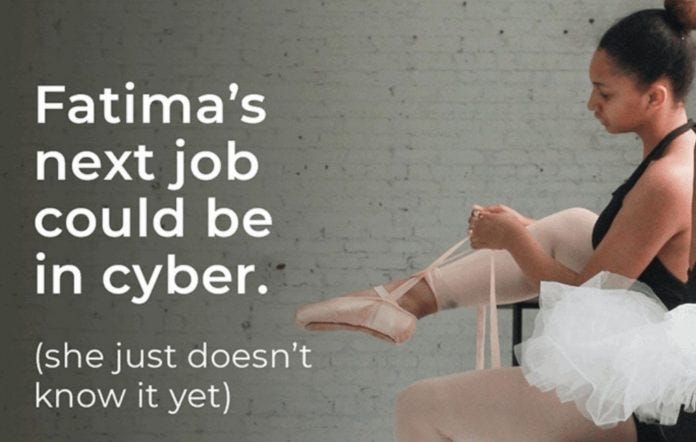The Arts Matter: A Call to Value Creativity in Today's World
Written on
The Importance of the Arts in Society
Recently, a provocative advertisement from the UK government has ignited widespread criticism for its blatant disregard for the arts, which are already reeling from the impacts of the COVID-19 pandemic. This ad, part of the "Rethink. Reskill. Reboot." initiative, depicts a ballerina preparing for her performance, accompanied by the message, "Fatima's next job could be in cyber (she just doesn’t know it yet)."

Picture: Krys Alex/Cyber First/UK Government
The online response was swift and vociferous, with many expressing their discontent. UK Culture Secretary Oliver Dowden even described the ad as "crass" on Twitter. Dr. Rosena Allin-Khan, Shadow Minister for Mental Health, tweeted a message of encouragement to Fatima, stating, "You be you. Don’t let anyone else tell you that you aren’t good enough because you don’t conform to their preconceived social norms."
However, this incident is just the latest chapter in what seems to be a global battle against the arts and humanities. For years, funding for artistic programs has dwindled due to the rising emphasis on STEM (Science, Technology, Engineering, and Mathematics) fields. Historically esteemed disciplines such as history, literature, and philosophy are now frequently dismissed as "useless" and "impractical." Recently, the Australian Federal Education Minister announced cuts to arts, humanities, and social science courses to promote enrollment in health and science programs. In the United States, former President Trump attempted to eliminate funding for the National Endowment for the Arts, among other cultural institutions.
This raises a critical question: In a society increasingly fixated on the physical sciences, what significance does the arts hold?
The reality is, I could argue that the arts are more vital now than ever. I could assert that the natural sciences benefit from the arts, especially in light of rapid scientific advancements, as evidenced by controversial cases like He Jiankui's genetically engineered babies. I could even claim that fields such as history, literature, and philosophy are crucial to preventing further societal decay. While these points are valid and worth discussing, that is not the focus of this piece.
Moreover, this discussion is not about how the arts serve individual interests. You may have heard it said that the arts underpin many aspects of your life—from the designs on your cushions to the films you enjoy and the games you play after work. While this is certainly true, the arts encompass so much more. They create meaning, foster community connections, promote innovative ideas, attract tourism, enhance educational experiences, improve well-being, and facilitate global communication, yielding many measurable benefits. Yet, what I wish to emphasize today is how these outcomes are intricately tied to the intrinsic value of the arts, which is often immeasurable.
Experiencing live theatre, for example, evokes a unique feeling that transcends the ordinary. In those moments, I can believe in magic. One evening I might immerse myself in a Shakespearean love story, and the next I could find myself observing life in a modest Brooklyn home. These artistic experiences forge connections with our cultural institutions. During a performance, every audience member shares a bond that fosters wonder, belonging, and a sense of childlike amazement. If you've ever felt this way, I don't need to persuade you of the arts' importance. They matter not because they boost the economy or brighten our homes, nor simply because they ethically balance scientific pursuits—they are vital due to their inherent worth. Our goal should be to help more individuals recognize this connection.
The pressing question then becomes: How do we achieve this? Governments worldwide have made their stance clear: they envision a future dominated by the hard sciences, leaving little room for creativity. The stereotype of the struggling artist who contributes minimally to society persists. What can we do to change this narrative?
In his speech titled "Why Supporting the Arts Makes Sense for Everyone," Rupert Myer, Chair of the Australian Council for the Arts, stated, "there is a real case to lead government here and not be led by it." This is precisely the approach we need. As Myer suggests, we should stop viewing arts funding as mere "support" or "subsidies" and recognize it for what it truly is: an investment. By backing the arts, you are investing in the long-term health, sustainability, and accessibility of the cultural experiences you cherish, from museums to libraries. This support also fosters education, raises awareness about significant global issues, and strengthens community ties.
Furthermore, as artists, we must advocate for respect. We need to elevate the status of artists to create a future where young creatives can pursue their passions without interference—whether financial or otherwise—from governments and institutions. In an era where creative thinking and originality are highly sought after yet increasingly rare, we must vocalize our worth—both intrinsic and extrinsic—until our voices are heard.
Lastly, and perhaps most crucially, we need to rally around our fellow creatives and energize the cultural sector. This could mean supporting local artists, pushing for more creatives in decision-making roles, or developing innovative strategies for creative advancement. The decline of the arts is entirely reversible.
I understand the challenges—after scrutinizing budgets and listening to political rhetoric, the outlook for the arts can appear bleak. However, the passion we have for our crafts and our collective dissatisfaction with the status quo could serve as the perfect catalyst for transformation. The arts are here to stay. As Margaret Atwood eloquently stated: "When any civilization is dust and ashes… art is all that’s left over. Images, words, music. Imaginative structures. Meaning—human meaning, that is— is defined by them."
Chapter 2: The Role of Creativity in Modern Society
In the video titled "Fatima Robinson | Questlove Supreme," the discussion emphasizes the importance of artistic expression and its relevance in today's world. It provides insights into how creativity shapes our culture and society.